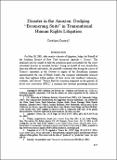|
Reseña:
|
Over the past two decades, the number of lawsuits filed against multinational corporate entities for environmental degradation and human rights abuses has skyrocketed. At the same time, U.S. courts have shown an increasing reluctance to hear such cases, turning to the common-law doctrine forum non conveniens (FNC) as a basis for dismissal. FNC dismissals usually mandate that corporate defendants submit to jurisdiction in the courts of the nation or nations where the alleged injuries occurred. While defendants often voluntarily agree to such stipulations, a disturbing practice has emerged in recent years: so-called boomerang litigation. Strengthened by procedural reforms, judiciaries abroad have proved both capable of entertaining complex environmental and human rights suits and willing to hold multinational businesses accountable. As a result, defendants have begun to mount challenges to the legitimacy of the very proceedings they assiduously lobbied for in the first place, challenges often brought in the same court that initially granted dismissal. These boomerang suits risk inconsistent results, create the possibility of substantial delay, and, depending on the claims at issue, threaten to magnify catastrophic harms to human rights and the environment. Using the infamous Aguinda v. Texaco and its progeny Republic of Ecuador v. ChevronTexaco as a case study, this Comment will propose a simple, though novel, solution: if a matter has been dismissed once on forum non conveniens grounds, subsequent courts must do everything in their power to ensure that foreign continuations go smoothly, including upending parallel litigation so that all claims stemming from the same nucleus of operative fact can be resolved in a single forum. This is particularly true when the stakes are not merely large sums of money, but the wellbeing of entire communities. To do otherwise sets the stage for manipulation and circumvention of judicial systems abroad. Further, even if businesses are ultimately held accountable, complications entailed by multiple international proceedings and appeals may, in the context of human rights and the environment, result in increased loss of life. |

